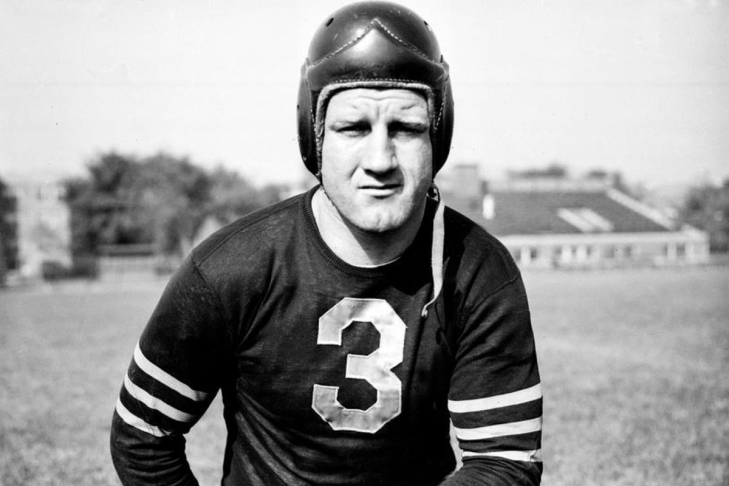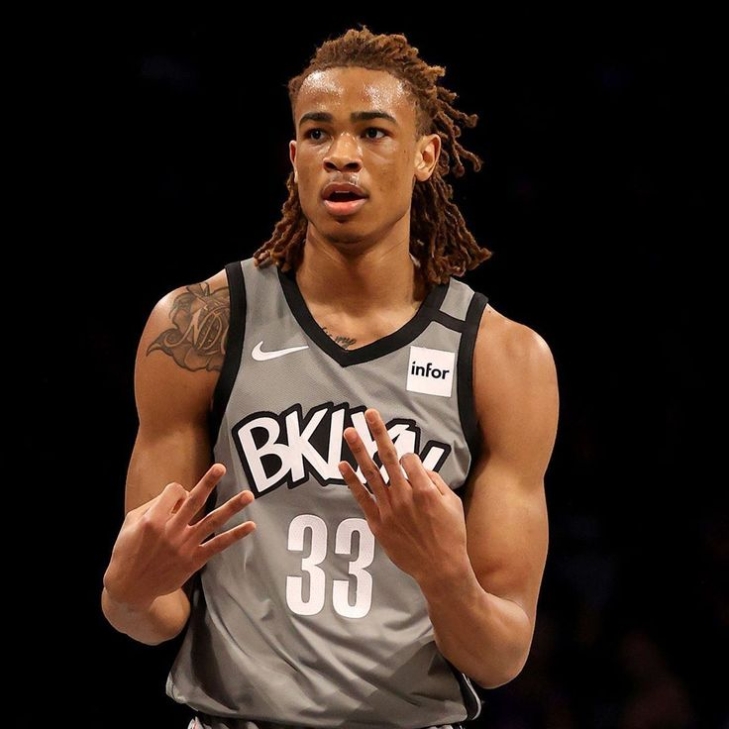
Committee Chairman
The Pro Football Hall of Fame Revisited Project: 1949 FINAL VOTE
Here we are! Again!!
If you have been following our Pro Football Hall of Fame Revisited Project, you know that we have asked the rhetorical question…what if the PFHOF began in January of 1946?
After soliciting and obtaining a passionate group of football fans and historians, we sent out a ballot for a Preliminary Vote, which we asked each voter to give us 25 names as their semi-finalists, and 5 in the Senior Pool. Following that, we asked the group to vote for their 15 Finalists in the Modern Era, and 3 in the Senior Category. The final stage was to vote for their 5 Modern Era inductees and 1 Senior inductee.
This is the result of the fourth official class;
Below, are the final results of this project based on 32 votes:
This is for the “Modern Era”
*Bold indicates they have been elected to the Pro Football Hall of Fame Revisited Class of 1949:
|
Player |
Year of Eligibility |
Vote Total |
|
Bronko Nagurski FB-LB-T |
1 |
28 |
|
Johnny Blood TB-HB-WB-BB-DB |
6 |
14 |
|
Danny Fortmann G-LB |
1 |
14 |
|
Lavvie Dilweg E |
10 |
13 |
|
Link Lyman T |
10 |
13 |
|
Vern Lewellen B |
12 |
12 |
|
Cliff Battles TB-FB-WB-DB |
7 |
12 |
|
Clark Hinkle FB-LB-HB-DB |
3 |
12 |
|
Joe Guyon WB-TB-BB-FB |
17 |
10 |
|
Dutch Sternaman HB-QB-FB |
17 |
9 |
|
Jimmy Conselman BB-TB-HB-E |
15 |
8 |
|
Mike Michalske G-T-LB-BB |
7 |
7 |
|
Ray Flaherty E-DB |
8 |
3 |
|
Ox Emerson G-C |
6 |
3 |
|
Tuffy Leemans FB-TB-DB-QB |
1 |
3 |
This is for the “Senior Era”
*Bold indicates they have been elected to the Pro Football Hall of Fame Revisited Class of 1949:
|
Ted Nesser |
N/A |
18 |
|
Blondy Wallce |
N/A |
8 |
|
Henry McDonald |
N/A |
3 |
|
1 person abstained |
About the 1949 Inductees:
Bronko Nagurski FB-LB-T, CHI 1930-37 & 1943: Inducted in 1949 on the 1st Ballot. Was inducted into the actual Pro Football Hall of Fame in 1963.
A powerful runner on offense, and punishing hitter on defense, Bronko Nagurski was a nine-year veteran of the NFL, all with the Chicago Bears. Nagurski did nothing fancy, nor did he need to do. Rushing for over 4,000 Yards, Nagurski took Chicago to three NFL Championships (1932, 1933 & 1943), the latter of which occurring after a five-year absence when he was a successful professional wrestler. Nagurski’s induction makes him the first person to enter on his first true year of eligibility in this project.
Johnny “Blood” McNally TB-HB-WB-BB-DB, MIL 1925, DUL 1926-27, POT 1928, GNB 1929-33 & 1935-36 & PIT 1934 & 1937-38: Inducted in 1949 on his 4th Ballot (technically his 6th year of eligibility). Was inducted into the actual Pro Football Hall of Fame in 1963.
Is there a better nickname than “Blood”? It was so good, that he was mostly known as “Johnny Blood”. From Notre Dame, McNally did it all, though excelled mostly at Halfback, and was the blueprint to what offensive skill players would later become. While McNally played for five different teams, it was the Green Bay Packers where he was mostly known for, having won four NFL Championships there (1929, 1930, 1931 & 1936).
Danny Fortmann G-LB, CHI 1936-4: Inducted in 1949 on the 1rd Ballot. Was inducted into the actual Pro Football Hall of Fame in 1965.
Danny Fortmann was about as good a blocker as there was. Playing for the Chicago Bears for the entirety of his career, Fortmann entered the NFL at the tender age of 20, but became a leader almost instantly. Fortmann called the signals for the lineman, and on defense, he was able to deduce his opponents plays, which often led to one of his punishing tackles. He would help lead Chicago win three NFL Championships (1940, 1941 & 1943), and individually was chosen for six consecutive First Team All-Pros (1938-43).
Lavvie Dilweg E, MIL 1926, GNB 1927-34: Inducted in 1949 on his 10th Ballot (technically his 12th year of eligibility). Was never inducted into the Pro Football Hall of Fame.
Lavvie Dilweg was a star at Marquette, and he would keep his athletic talents in the state of Wisconsin, as he signed with the Milwaukee Badgers in 1926. The stay in Milwaukee was short-lived as the team folded that year. He would travel north and join the Green Bay Packers in 1927, an organization he played for until 1934. Dilweg was considered to be one of the most complete players of his era, a time frame in which the football players performed at both ends, and his peers viewed him as one of the top tacklers and blockers of his day. Stats back then were not well kept, but he was also a decent offensive weapon, and overall, he helped the Green Bay Packers win three consecutive NFL Championships (1929, 1930 & 1931).
Link Lyman T, CAN 1922-23 & 1925, CLE 1924, FRN 1925, CHI 1926-34: Inducted in 1949 on his 4rd Ballot (technically his 10th year of eligibility). Was inducted into the actual Pro Football Hall of Fame in 1964.
William Roy “Link” Lyman was known for his pioneering style of shifting on defense, which helped enable the former Nebraska Cornhusker to carve out an 11-year career in the NFL. One of the first true “Defensive Quarterbacks” of the game, Lyman signed with the Canton Bulldogs in 1922, and he helped them win that year’s title and the one after. He was one of many players to be sold to the Cleveland franchise, where he won a third Championship in as many seasons. Lyman joined the Chicago Bears in 1926, where he played until 1934. As a Bear, the Tackle won his fourth NFL Championship (1933), and was twice a First Team All-Pro.
Ted Nesser: Inducted in 1949 on the 4th Senior Ballot. Was never inducted into the Pro Football Hall of Fame.
Ted Nesser was a member of the first great family of football, the seven Nesser brothers who all starred on the gridiron. Never playing college ball, or even finishing high school, Ted was considered the toughest of the brood, and though he played professionally for many teams, he is primarily associated with the Columbus Panhandles of the Ohio League, and later the early NFL. He also won three Ohio League Titles with Massillon.
16. Nic Claxton
The last five years have been tumultuous for the Brooklyn Nets, who have watched stars arrive and leave without winning a championship, but they have found some stability with Nic Claxton at Center.
A high Second Round Pick from the University of Georgia, Claxton fought through injury and demotion to the G-League in his first two seasons. Still, in 2021-22, Claxton was a regular in the rotation, starting 19 Games, averaging 8.7 Points and 5.6 Rebounds per Game. Showing solid defense, Claxton became Brooklyn’s starting Center in 2022-23, and while his free throw shooting is abysmal, he is efficient in his shot selection, leading the league in 2022-23 in 2-Point Shooting Percentage, Shooting Percentage, and Effective Shooting Percentage.
"The Slim Reaper" did not lead the NBA in any category in 2023-24, but had his best rebounding number with 9.9. Claxton regressed somewhat last year (7.4 RPG), but he is still young, and on a team that has had as much turnover as Brooklyn, he could find his way in the top ten on this list.
Play Balloon Game by SmartSoft Gaming: Boost Your Wins With the Best Ultimate Slot Review
Gambling – it's what you need if you want to have an exciting time and earn money doing something nice. With the right skill, you will be able to give up your main job and earn money at the casino. But for a start, you should pick up a good institution and "your" slot machine. The slot machine Balloon from the company Smartsoft gets a lot of positive feedback.
A Game That Takes You to New Heights
When it comes to immersive and rewarding slot games, Balloon SmartSoft Gaming is a breath of fresh air. This innovative and visually stunning slot game will take you on an unforgettable journey to new heights. Get ready for an adventure in the sky as you spin the reels on this balloon-themed slot machine.
Don't let the light-hearted theme fool you – Balloon is a game that offers serious winning potential. With its vibrant graphics, engaging gameplay, and lucrative features, this slot game is designed to boost your wins and keep you entertained for hours on end.
An Overview of Balloon SmartSoft Slot
- Gameplay:
Balloon is a 5x3 slot game that features 25 paylines. The reels are filled with colorful balloons, cheerful music, and captivating animations that bring the game to life. You'll find various symbols on the reels, including balloons in different colors, numbers, and letters.
- Special Features:
Balloon offers a range of special features to enhance your gameplay. Look out for the wild symbol, represented by the Balloon logo, which can substitute for other symbols to create winning combinations. The game also includes a scatter symbol, represented by a Golden Ticket, which can trigger the free spins feature.
- Free Spins:
The free spins feature is where the real excitement begins. Land three or more Golden Ticket scatters anywhere on the reels, and you'll be rewarded with a number of free spins. During the free spins, the Balloon feature is activated, which can lead to even bigger wins.
Experience the Thrill of Balloon SmartSoft Slot
Balloon by SmartSoft Gaming is a game that truly stands out in the vast sea of slot machines. Its captivating design, rewarding features, and user-friendly interface make it a top choice for both new and experienced players. Whether you're a casual player looking for some entertainment or a high roller chasing big wins, Balloon has something to offer.
With its high-quality graphics, smooth gameplay, and exciting bonus rounds, Balloon ensures a thrilling and immersive gaming experience. The game is optimized for both desktop and mobile play, allowing you to enjoy the adventure wherever you go. Whether you're on your lunch break or relaxing at home, Balloon is always just a click away.
So, if you're looking for a slot game that will take your winnings to new heights, look no further than Balloon by SmartSoft Gaming. With its unique theme, engaging features, and potential for big wins, this game is a must-try for all slot enthusiasts. Give it a spin today and see how Balloon can boost your wins!
The Revolutionary Impact of Virtual Reality on Modern Society
Virtual Reality (VR), originally seen as a gaming tool, has permeated various sectors, revolutionizing the way we learn, train, simulate, exercise, and access healthcare. A deeper dive into the current applications and challenges of VR offers a comprehensive view of its transformative power in our daily lives.
Virtual Reality: The Digital Leap
Virtual Reality is a technological marvel that introduces users to a three-dimensional, computer-simulated environment, encouraging interaction. Using displays ranging from computers to wearable devices like head-mounted displays (HMD), VR creates an immersive digital experience as for example we can see on the resource https://www.tnhta.net/ where different types of virtual entertainment and informative materials are provided.
The primary categories of VR are:
- Non-immersive VR: Using screens around the user, it provides a virtual experience. An apt example is the driving or flight simulators, enveloping the user in a pseudo-reality.
- Immersive VR: Using wearable devices, such as HMDs, it allows 360-degree immersion into the virtual realm.
In the spectrum between real and virtual worlds, we find Augmented Reality (AR), overlaying digital imagery onto the physical world. This blending of AR and VR is termed Mixed Reality (XR).
Tracing the Roots of VR
The inception of VR dates back to the 1960s with Morton's Telesphere Mask and the Sensorama. These technologies aim to envelop the user in a cinematic experience. The subsequent decades saw the introduction of Oculus, which skyrocketed VR's popularity. Today, devices like HTC Vive, Samsung VR, Oculus, and Google Cardboard stand testimony to VR's mainstream adoption.
VR Beyond Gaming: A Multidimensional Tool
Dismantling the gaming stereotype, VR's applications span across:
- Education: Enhancing learning experiences and making complex topics comprehensible.
- Training: Creating real-life scenarios for better learning without the risks.
- Simulations: Replicating environments for training in aviation, driving, or medical procedures.
- Healthcare: Assisting in therapy, pain management, and surgical simulations.
However, the adoption of VR isn't devoid of challenges. From technological constraints to high costs and health concerns, the journey of VR has its share of hurdles. Yet, the relentless endeavors in research and development hint at a promising future.
A Closer Look at VR Applications
Industrial Simulation: Training with Precision
VR in industrial domains stands out, specifically in driving, flying, and military simulations. Here, the emphasis is on precision training without the associated risks.
Driving Simulations
Driving simulations offer an impeccable tool for training, behavioral studies, and data collection. Young drivers can harness VR to polish their skills, ensuring safer roads. Moreover, data gathered from these simulations aids in refining vehicle safety features and propelling the development of autonomous vehicles.
Bridging the Knowledge Gap
It's crucial to elevate the general understanding of VR's strengths and limitations. By focusing on its applications and challenges, we can harness VR's full potential, ensuring a transformative impact on various sectors.
In Conclusion
The versatility of Virtual Reality makes it a cornerstone of future technological advancements. Its adoption across diverse fields reinforces its potential to redefine the way we perceive the digital realm. As VR continues to evolve, it stands poised to usher in a new era, reimagining how we interact with the world around us.





